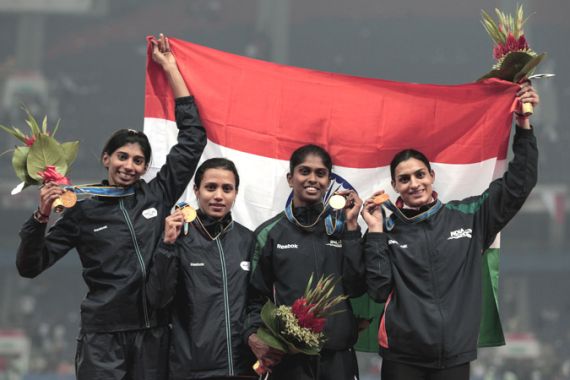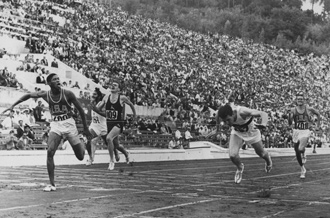Doping scandal hangs over Indian athletics
The coach of India’s top female 400m runners is sacked after another athlete tests positive for illegal drug use.

 |
| Akkunji celebrates winning the gold medal in the women’s 400m hurdles final at the 2010 Asian Games [GALLO/GETTY] |
India’s sports minister sacked the Ukrainian coach of the country’s top female 400m runners on Tuesday after six of them tested positive for banned steroids in a major doping scandal.
“I have asked for his removal. He has already been removed,” Ajay Maken told a news conference in New Delhi, referring to Yuri Ogrodnik, who coached three of the six to gold medals at the Commonwealth and Asian Games last year.
Keep reading
list of 4 itemsKiptum remembered in Kenya’s London marathon double
OJ Simpson dies after battle with cancer
British runner completes challenge to run length of Africa
Late Monday, one of India’s brightest female track stars, Ashwini Akkunji, joined her 4x400m relay team-mates Sini Jose and Mandeep Kaur in failing a drugs test because of traces of a banned anabolic steroid in her urine.
Akkunji, Jose and Kaur were part of India’s Commonwealth and Asian Games-winning team in New Delhi and Guangzhou, China, last year. Akkunji also took the 400m hurdles Asian title in a personal best time.
The trio are among eight athletes – six female 400m runners, a female shotputter and a male long-jumper – who have now failed drugs tests, casting a cloud over Indian athletics and denting the country’s Olympic ambitions.
Ignorant and innocent
All have been provisionally suspended pending the testing of their second, or “B”, samples later this week, the National Anti-Doping Agency (NADA) said on Tuesday.
The athletes have all protested their innocence and blamed contaminated food supplements for the results. They have also claimed that there were not enough doctors to advise them on which supplements to take.
“I’m innocent and I’ll prove it. I won’t let all my years of sweat and blood be tainted,” Akkunji was quoted as saying by the Asian Age newspaper.
|
“I have given only medals and not steroids” Sacked coach Yuri Ogrodnik |
The coach in question Ogrodnik also said he was innocent, claiming he had asked his athletes to “buy only food supplements and not steroids”.
“I am not a fool to tell athletes to buy and consume something which is in the WADA (World Anti-Doping Agency) list. I have given only medals and not steroids,” he told the Times Now television news network.
Maken told reporters he has asked the Sports Authority of India, NADA and the Athletics Federation of India for detailed reports into the circumstances leading to the positive tests, and ordered an inquiry by a retired high court judge.
“We will catch coaches and officials who were involved, not just athletes,” Maken vowed, adding: “We can’t be lenient.”
“The coach says he didn’t know that the athletes were taking banned substances – then I think he’s all the more responsible for what’s happened. The coach is supposed to know what they’re taking and tell them what to take.”
 |
| “The Flying Sikh” finishing a close fourth in the 1960 Olympics 400m final [GALLO/GETTY] |
India has never won a track medal at the Olympics and the women’s 4x400m relay team was seen as the country’s biggest hope of a podium finish at next year’s Games in London after their Commonwealth and Asiad golds.
They had been due to compete in the Asian Championships in Japan later this week.
The director-general of NADA, Rahul Bhatnagar, said the fourth member of the women’s 4x400m relay team, Manjeet Kaur, had not been tested.
Legendary Indian athlete Milkha “The Flying Sikh” Singh, who narrowly missed a bronze in the men’s 400m at the 1960 Olympic Games in Rome, said the decision was right.
“Strict action should be taken against coaches as I think they are the main culprits.”
“Action should also be taken against (the athletics) federation and doctors,” Singh, who won India’s first Commonwealth Games track gold in the 400m in Cardiff in 1958, also said.
“I think the athletes who failed dope tests should be stripped of their medals and cash incentives and awards given to them be taken back. This will be a lesson for others.”